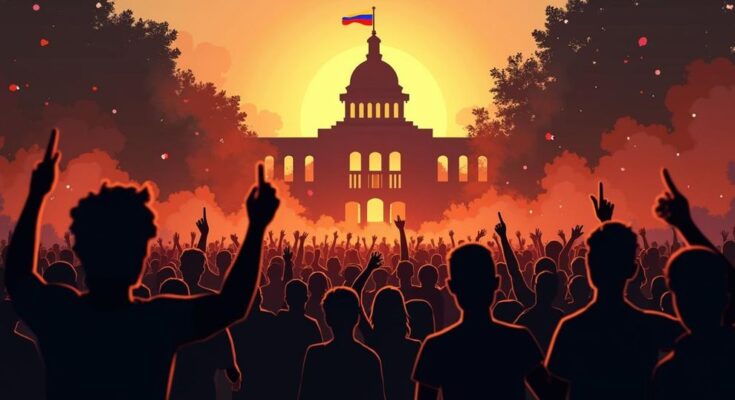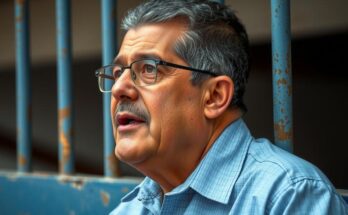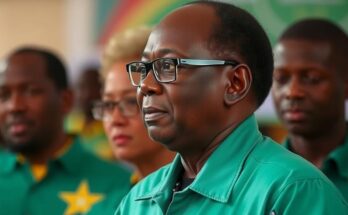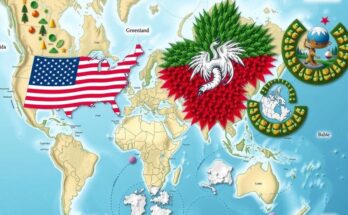Small opposition protests occurred in Venezuela two months after the disputed presidential election won by President Nicolas Maduro. Maria Corina Machado, in hiding, prompted smaller gatherings to avoid security crackdowns. The opposition claims their candidate, Edmundo Gonzalez Urrutia, won with 67% of the vote, whereas Maduro declared victory with 52%. Violence and repression followed the election, leading to numerous arrests and fatalities. International calls for dialogue have emerged as the political climate remains tense.
On Saturday, various small groups of opposition protesters convened in Venezuela, marking two months since President Nicolas Maduro purportedly won a contentious presidential election. These gatherings, supported by individuals from abroad, followed a call by opposition leader Maria Corina Machado, who remains in hiding after denouncing the electoral outcome as fraudulent. In an attempt to mitigate the risk of security crackdowns familiar from previous protests, she advocated for reduced-size assemblies. Approximately 30 individuals gathered in a plaza in Caracas, chanting slogans including Leida Brito, famously dubbed the “Red Helmet Grandmother” due to her extensive history of activism against the government. “Nicolas Maduro should leave because he lost,” she expressed, while holding a placard stating, “To defend the vote is a right.” Retired Colonel Hidalgo Valero articulated the sentiments of many when he remarked, “The freedom of Venezuela is in danger. Today our people are afraid to be in the streets because there is tremendous repression.” Machado reinforced this sentiment in a voice note to her supporters, asserting, “Here we are standing firm, advancing every day with more strength and enthusiasm, gathered here as the brave and good Venezuela.” The political landscape has become increasingly dire since the disputed election, with numerous opposition figures arrested and over 2,400 individuals accused of terrorism merely for participating in protests. Tragically, the violent aftermath of the election resulted in 27 fatalities. Opposition factions claim that their candidate, Edmundo Gonzalez Urrutia, earned 67% of the vote in the July 28 election based on their own tally from polling stations. Conversely, the pro-government National Electoral Council declared Maduro the victor with a reported 52%, yet has failed to provide the legally mandated detailed voting results. Gonzalez Urrutia, a 75-year-old former diplomat, sought asylum in Spain after spending several weeks evading capture in Venezuela. Meanwhile, considerable uprisings took place outside the nation, with protests in cities such as Mexico City, Buenos Aires, Panama City, and Montevideo. In Madrid, Gonzalez Urrutia greeted supporters, among whom waved the Venezuelan flag. In stark contrast, hundreds of Maduro supporters marched through Caracas to celebrate his electoral win. Maduro dismissed Machado’s opposition by declaring, “the supposed queen bee… is beginning to pack her Gucci suitcases… she is preparing to leave, too.” He continued, stating, “We are not in Madrid, we are not hiding, we are in the street.” In a more diplomatic response, approximately 30 countries, spearheaded by the United States and Argentina, have urged Maduro to facilitate dialogues with opposition forces. They issued a joint statement advocating for ‘constructive and inclusive discussions’ concerning a democratic transition and the immediate release of Venezuelans detained in the wake of the electoral crisis.
The situation in Venezuela has been tumultuous, especially following a highly contested presidential election held on July 28, 2023. President Nicolas Maduro claimed victory, but the election was marred by allegations of fraud and widespread opposition protests. The political environment has steepened, as opposition leaders and supporters have faced increasing repression. Maria Corina Machado has emerged as a prominent opposition figure, advocating for the basic rights of citizens to have their votes counted and to oppose the authoritarian regime. Amidst escalating unrest and international scrutiny, the plight of the Venezuelan people remains critical, as they continue to fight for democracy and freedom in the face of oppression.
The ongoing protests in Venezuela, sparked by the recent disputed presidential election, underscore the deep divisions within the country regarding democratic governance. The opposition, led by Maria Corina Machado, contends that both the election outcome and Maduro’s claims of victory are fraudulent. Accusations of repression against dissenters and significant opposition protests illustrate the precarious state of political affairs in Venezuela. As calls for dialogue emerge from the international community, the struggle for a transparent and fair electoral process continues to be paramount for the Venezuelan citizens longing for freedom and democracy.
Original Source: www.voanews.com




